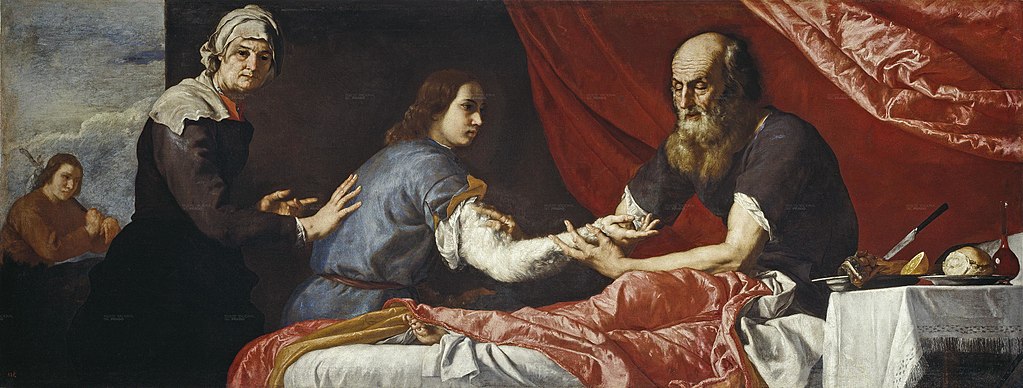“Measure for Measure”
There is a millennia old debate whether Yaakov did right in deceiving his father into giving him Esav’s blessings. I believe the answer is in the Talmudic idiom which is the title of this article. The rabbis coined that idiom because they noticed that the biblical narrative shows parallelism between one’s actions and their consequences. I would like to use this idiom as an interpretive tool as we follow the trajectory of Yaakov’s life and let you, the reader, answer the question presented above (all references are to Genesis, unless otherwise stated).
Yaakov pretends to be his twin brother to take the blessing which is not his (27:6-29). He is later deceived by Leah, who pretends to be her sister to take a husband who is not hers (29:15-26). I believe that Leah and Rachel were twins, but it is not clearly written in the Torah.
When Yaakov accuses Lavan of deceiving him, Lavan answers “here we do not let the younger go before the older”. Lavan reminds Yaakov that he was the one who put the younger before the older when he took the blessing from his father.
Yaakov deceived his father using goats and garments (27:14-16). Later, when Yaakov’s sons tried to cover up Yosef’s disappearance, they made Yaakov believe that Yosef was devoured by a wild beast. They deceive him by dipping Yosef’s garments in goat’s blood (37:31-33).
Yaakov tells Rivka that he is afraid that his father will feel him out and identify him. He uses the Hebrew root משש (27:12). Later, when Lavan chases Yaakov and accuses him of theft, Yaakov angrily asks Lavan what he has found when he felt out all of Yaakov’s belongings. The word Yaakov uses is again משש (31:37).
When Yaakov expresses his fear of being exposed as a liar to his mother, he says that he might bring upon himself a curse rather than a blessing. His mother responds that in that case, the curse will be upon her. She uses the word עלי to say “upon me” (27:13). Many years later Yosef the viceroy of Egypt, imprisons Shimon and conditions his release in bringing Binyamin to him. Yaakov is devastated by that request and tells his sons “Yosef is gone, Shimon is gone, and now you want to take Binyamin? All of them came upon me!” In all of them he refers to curses or disasters, and the word he uses for “upon me” is עלי, the same word his mother used to tell him that nothing evil will befall him.
Yaakov’s actions created sibling rivalry and caused him to separate from his parents for more than twenty years. Later, Yosef’s dreams, encouraged by Yaakov, cause sibling rivalry which leads to the separation of Yaakov and Yosef for over twenty years.
I have presented here six instances of reciprocity in Yaakov’s, but I know that not everyone will be convinced. Some will use Yaakov’s struggle with the mysterious man (32:24-29), as a proof that the blessing was really his and he did right in taking it from Esav.
To answer that, I will provide two more points.
First, when Yaakov is presented by Yosef to Pharaoh and asked how old he is, he answers that his life was short and miserable and did not match the lives of his forefathers (47:9). When Yaakov reflects on his life he does not see a blessing!
Second, history has proven that as a nation, we have not received the material abundance promised to Esav. Rather, we have inherited the spiritual blessing, the blessing of Avraham, which is given to Yaakov rightfully and intentionally by Yitzhak (28:3-4).
I laid the verses, and a little history, before you. Now you be the judge of these actions, and as is the purpose of the Biblical narrative, apply the conclusion to your daily life.
Shabbat Shalom
Questions on Parasha Toledot
Toledot
In the beginning of the Parasha we read that Yitzhak and Rivka did not have children. Yitzhak prayed to HaShem and they were blessed with children.
- What were the names of the children?
- Who was born first and who was born second?
- What are the rights of the firstborn?
- Who became a shepherd, living in tents?
- Who became a hunter, a man of the field?
- When Yitzhak was very old, he wanted to grant a special blessing to his son ______.
- What did Yitzhak ask that son to do before giving him the blessing?
- Who overheard Yitzhak talking to his son about the blessing?
- Rivka wanted ___________ to receive the blessing.
- What did Rivka do so that her son would receive the blessing?
- What did Yitzhak do when Yaakov entered his tent and asked for a blessing?
- What did Yitzhak tell Yaakov?
- What blessing did Yaakov get from Yitzhak?
- What did Esav do when he heard that his younger brother took the blessing?
- What was the blessing that Esav did get from Yitzhak?
- What did Rivka tell Yaakov to do?
Answers for Parasha Toledot
- Esav and Yaakov.
- Esav was born first, and Yaakov was born second?
- The rights of the firstborn are: a. he will inherit twice as much as his brother. b. he will be the leader of the family.
- Yaakov.
- Esav.
- Esav.
- He asked Esav to prepare the special food Yitzhak liked.
- Rivka overheard Yitzhak talking to Esav about the blessing.
- Rivka wanted Yaakov to receive the blessing.
- She told Yaakov to disguise himself as Esav and bring food to Yitzhak.
- Because Yitzhak was blind, he felt his son’s hands to know if he was Esav.
- The voice is the voice of Yaakov but the hands are the hands of Esau.
- That he would inherit the leadership of the Jewish People.
- He was very upset, he cried, and asked his father for a blessing.
- That he would live off the land and have plenty of food.
- Rivka told Yaakov to escape to Haran, where her family lived.
Toledot – Parasha Pointers
- Yitzhak prays for Rivka (25:21). Why didn’t Rivka pray for herself? It seems that before Hannan prayed for herself (I Sam. 1:9-16) the concept of prayer was bringing one’s request to a representative.
- Rashi, following the midrash, assumes that both Yitzhak and Rivka prayed, and he therefore asks why it is written that God answered Yitzhak only. He replies that Yitzhak’s prayer was better because he was a Tzaddik and his father was a Tzaddik, whereas Rivka’s father was wicked. This answer presents several problems: 1. Is free will compromised because of one’s genealogy? 2. We learn elsewhere in the Torah that people are not assessed based on their parents’ transgressions. 3. Rivka’s prayer should be the one answered, because she overcame difficult circumstances to be righteous.
- How does Rivka seek God’s advice? Is it her personal channel? Does she talk to a person who has a channel of communication with God? If so, who is that person and why is he or she anonymous?
- Why doesn’t Rivka tell Yitzhak of the message she received?
- Is it possible to interpret the message differently? Did it come true according to any interpretation?
- Esav was probably not a redhead. The word אדמוני in the bible means fair skin that reddens easily. Compare the description of the beloved in Song of Songs (5:10-11) in which he is both אדום and has black hair.
- That opens the door to the possibility that Yaakov and Esav were identical twins, which explains why Yaakov was concerned only about hairiness and not physique.
- Esav is not described as a wicked person anywhere in the Parasha. Where did this notion come from? Note that he threatens to kill Yaakov but never carries it out.
- Yaakov does not buy Esav’s blessing. He buys the right of the firstborn which entitles him to a double portion of the inheritance. Esav’s disregard for it could be explained by the long lifespan of his forefathers.
- That also explains why Yaakov did not tell his father about the transaction, and why Esav later refers to the stealing of the blessing and the acquisition of the right of the firstborn as two separate actions (27:36).
- In 27:5 Rivka hears Yitzhak speaking to Esav, and in 27:42 she is being told of Esav’s secret plans. How does she get the information?
- When Rivka tells Yaakov to deceive his father, he answers אולי ימושני אבי (27:12) – it is usually translated as Yaakov’s concern about his father exposing his deception, but the Talmud (Makkot 24:1) interprets אולי as a wish. Rashi explains there that Yaakov wished for his father to feel his skin and expose him, because he did not want to deceive Yitzhak. Rashi continues to say that Rivka forced Yaakov to do it.
- According to this, we could say that despite being a twin, Yaakov made no effort to imitate Esav’s mannerisms and way of speech because he wanted Yitzhak to expose him.
- Yaakov could have told Yitzhak outright that he is an impostor, but he did not do it because Rivka was probably listening behind the door, and he did not want to defy her directly.
- Rivka promises Yaakov that if his actions will bring about a curse, it will be upon her – עלי קללתך. It is interesting to note that many years later, when Yaakov mourns the loss of Yosef, Shimon, and perhaps Binyamin, he says עלי היו כולנה – they were all upon me (Gen. 42:36). It seems that he recognizes that he alone bears responsibility for his actions.
- Yitzhak gives Yaakov a blessing of physical prowess and abundance (27:28-29), and then tells Esav that he has no blessing left for him. Later, when Yaakov leaves for Haran, Yitzhak gives him Avraham’s blessing, which makes Yaakov Yitzhak’s spiritual heir.
- This suggests that Yitzhak planned to have Esav and Yaakov lead together because he recognized their different personalities.
- Had Rivka approached Yitzhak with her concerns about the future of the family and the nation, and about her perception of Yaakov and Esav, Yitzhak might have explained his intention and they would reach an understanding.
- The lack of communication between Yitzhak and Rivka had disastrous consequences as it pushed Yaakov away, caused him to be deceived time and again, and bred sibling rivalry between Yaakov’s children.
- Suggestion: at your Shabbat table, after discussing Parasha and commentaries, and maybe the points presented here, cast four people as Yitzhak, Rivka, Yaakov, and Esav, and have them talk to each other.



















